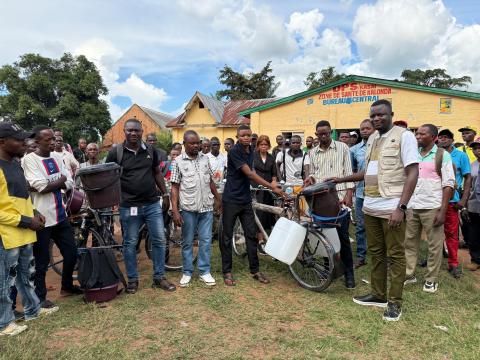DR Congo: From Training to Action - New Tools for Community Health Relays To Fight Child Mortality in Kasai

As part of the fight against the deadliest diseases affecting children under five in the DRC (malaria, diarrheal diseases, and acute respiratory infections), the Rotary Healthy Communities Challenge (RHCC) project, implemented by World Vision in consortium with PATH and Rotary, is organising essential training sessions for community health relays in care sites across Kasaï Province, DRC.
The RHCC project directly addresses the main causes of child mortality in the region: malaria, acute respiratory infections, and diarrheal diseases, three conditions responsible for high child mortality in the most vulnerable areas.
These training sessions will enable community relays to acquire the necessary knowledge to identify, guide, and support sick children within their communities.
“By equipping community relays with appropriate tools and strengthening their capacities, the project aims to significantly reduce the mortality rate of children under five in the 14 targeted health zones of Kasaï,” explains Dr. Bob Ibrahim, program lead at World Vision.
This initiative is part of a broader strategy to improve access to primary health care in rural and hard-to-reach areas of the DRC.
“Handwashing kits will strengthen essential hygiene practices for preventing infectious diseases, particularly diarrheal illnesses, while bicycles will facilitate the mobility of community relays to health centers to collect medical supplies and allow them to reach families and children more effectively in remote villages,” explains Dr. Jacques Kakajika, Project Coordinator at World Vision.
These health workers, true pillars of community health, will not only be trained but also equipped to ensure close monitoring, effective awareness campaigns, and rapid management of simple cases.
To effectively respond to child health needs, the project has provided 521 bicycles and 521 handwashing kits to community health relays at care sites.
The Chief Medical Officer of Kalonda Ouest health zone welcomed this initiative:
“These bicycles and other kits are essential for the proper functioning of community health sites. They will allow relays to cover their intervention areas better. I sincerely thank the partners for this support and their continued accompaniment,” declared Dr. Justin Mbaya, Head Nurse of the health zone.
The RHCC project aims to reach 221,438 children, including 112,933 girls and 108,505 boys, through a strengthened network of 1,000 community health sites and the training of 2,000 community relays.
Through this action, the RHCC project reaffirms its commitment to significantly reducing child mortality linked to the deadliest diseases among children under five in the DRC. By placing community relays at the heart of health action, the project focuses on proximity, prevention, and active community participation to sustainably improve child health.